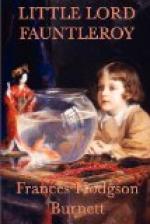The small hand went on stroking this new friend as Cedric answered:
“Well, there was Dick,” he said. “You’d like Dick, he’s so square.”
This was an Americanism the Earl was not prepared for.
“What does that mean?” he inquired.
Lord Fauntleroy paused a moment to reflect. He was not very sure himself what it meant. He had taken it for granted as meaning something very creditable because Dick had been fond of using it.
“I think it means that he wouldn’t cheat any one,” he exclaimed; “or hit a boy who was under his size, and that he blacks people’s boots very well and makes them shine as much as he can. He’s a perfessional bootblack.”
“And he’s one of your acquaintances, is he?” said the Earl.
“He is an old friend of mine,” replied his grandson. “Not quite as old as Mr. Hobbs, but quite old. He gave me a present just before the ship sailed.”
He put his hand into his pocket and drew forth a neatly folded red object and opened it with an air of affectionate pride. It was the red silk handkerchief with the large purple horse-shoes and heads on it.
“He gave me this,” said his young lordship. “I shall keep it always. You can wear it round your neck or keep it in your pocket. He bought it with the first money he earned after I bought Jake out and gave him the new brushes. It’s a keepsake. I put some poetry in Mr. Hobbs’s watch. It was, ‘When this you see, remember me.’ When this I see, I shall always remember Dick.”
The sensations of the Right Honorable the Earl of Dorincourt could scarcely be described. He was not an old nobleman who was very easily bewildered, because he had seen a great deal of the world; but here was something he found so novel that it almost took his lordly breath away, and caused him some singular emotions. He had never cared for children; he had been so occupied with his own pleasures that he had never had time to care for them. His own sons had not interested him when they were very young—though sometimes he remembered having thought Cedric’s father a handsome and strong little fellow. He had been so selfish himself that he had missed the pleasure of seeing unselfishness in others, and he had not known how tender and faithful and affectionate a kind-hearted little child can be, and how innocent and unconscious are its simple, generous impulses. A boy had always seemed to him a most objectionable little animal, selfish and greedy and boisterous when not under strict restraint; his own two eldest sons had given their tutors constant trouble and annoyance, and of the younger one he fancied he had heard few complaints because the boy was of no particular importance. It had never once occurred to him that he should like his grandson; he had sent for the little Cedric because his pride impelled him to do so. If the boy was to take his place in the future, he did not wish his name to be made ridiculous by descending to an uneducated




